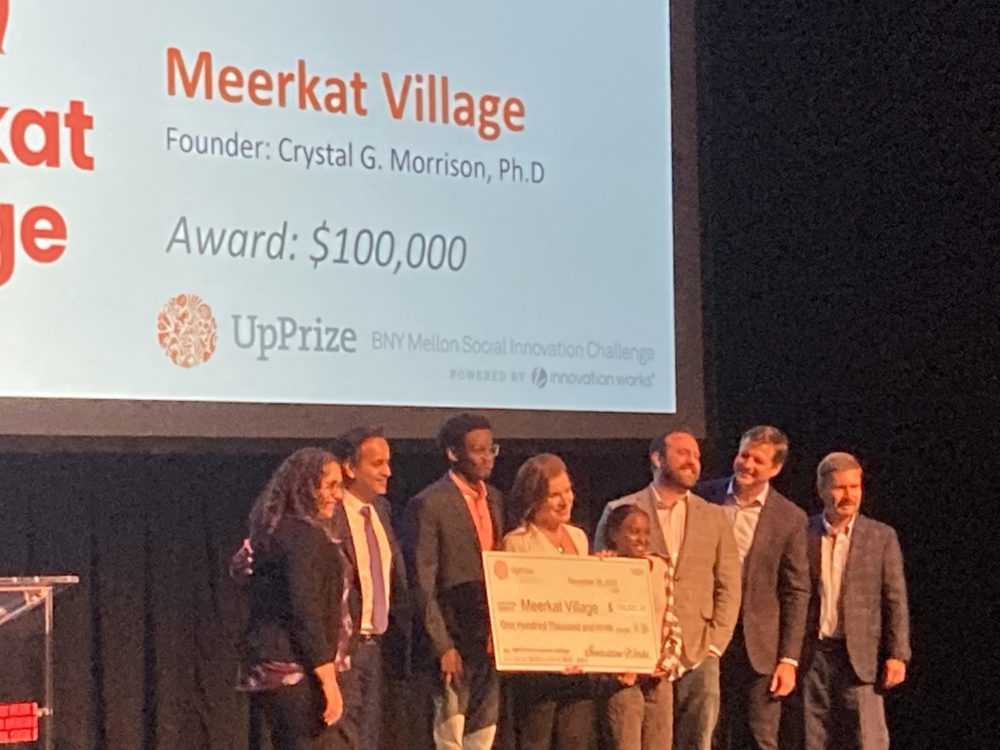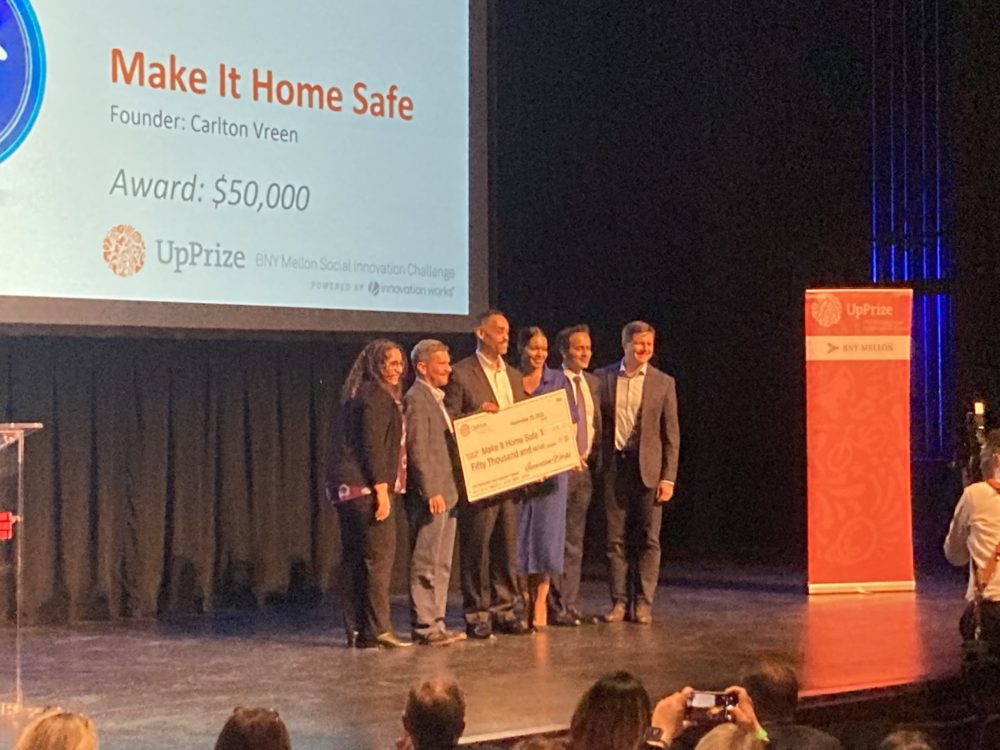This fifth challenge cycle focused on solutions aimed at promoting racial and economic justice in Southwestern Pennsylvania.
Although not every participating startup could claim funding, showrunners BNY Mellon Foundation and Innovation Works still thought all of the finalists deserved a party and a chance to talk about their companies after their eight-month journey. Ten finalists and their supporters gathered at the August Wilson African American Cultural Center on Tuesday to make one final pitch for their companies, share their products’ milestones, and learn who’d be taking home thousands in prize money.
The UpPrize challenge launched in 2015 to fund companies founded by entrepreneurs of marginalized or economically underserved backgrounds. The challenge has since invested $2.5 million into 20 companies. At the culmination of the 2022 edition, between three different prizes, it awarded $300,000 to Precision Neuro, Meerkat Village and Make It Home Safe who were the first, second and third place winners, respectively.
All 10 companies — from a mobile retail startup to a machine learning company — made a final pitch to the judges and any potential investors in the crowd before the selections were made. Over the course of an hour, the semifinalists described their companies’ origins and what they would do with the prize money should they be named the winner.
Precision Neuro — First place
With the $150,000 winnings, Jasmine Kwasa, chief technology officer of Precision Neuro, said the company wants to use its neurotech to make medicine more inclusive.
An EEG, or electroencephalogram, is a test that measures electrical activity in the brain using small, metal discs attached to the scalp. The problem, Kwasa said, is that EEG aren’t quite as effective on curly hair types and hairstyles most likely to be worn by Black patients.
“Some of my studies show that Black people are excluded from a lot of these EEG clinical trials,” Kwasa said. “This leads to incomplete data on the neuroscience base, of which I’m a part, and also misdiagnosis in hospital and clinical areas.”
Precision Neuro’s Sevo clip improves electrode-scalp contact for people with coarse or curly hair. Additionally, its EEG cap reduces setup time and expands EEG availability. Kwasa said the company plans to use the prize money to transition from 3D printing to injection molding manufacturing. The funding will also enable the company to move toward gaining FDA clearance, which would allow it to operate in hospitals.
“Thank you, and let’s make EEG accessible for all,” Kwasa said in her acceptance speech.
Meerkat Village — Second place

Taking home $100,000 and second place, Crystal Morrison, founder and CEO of Meerkat Village, explained she’d be using the money to expand. Meerkat Village is a platform created to help the parents of children with special needs ensure that everyone from caregivers to doctors can be in communication about their needs. The app is both HIPAA and FERPA compliant, Morrison said, and creates the kind of village she needed as a parent.
“Parents, like myself, often feel powerless and overwhelmed and frustrated, trying to keep all of their child’s caregivers and providers on the same page and working together,” Morrison said. “And healthcare disparities that we know exist further compound these issues.”
Morrison added that she plans to conduct a technology assessment, reach out to underserved families, and refine the platform’s content to better serve its users.
Make It Home Safe — Third place

Make It Home Safe was awarded $50,000 and third place in the competition. Make It Home Safe is an app developed by Carlton and Pamela Vreen drawing on Carlton Vreen’s past experiences with racial profiling and law enforcement. With the app in hand, a driver would have verification that the person stopping them was a member of law enforcement, and be given the reason they were being stopped. On the police officer’s side, they’d have all the driver’s info accessible, too. The goal, Vreen said, is to restore trust between civilians and law enforcement and prevent police shootings that cost lives, as well as millions of dollars in lawsuits.
“This risky shoot-first behavior has led to lawsuits costing municipalities and cities like Pittsburgh over $300 million a year and including our own Leon Ford, but we can build that relationship again,” Vreen said. “We can build security and safety during traffic stops using smartphone technology.”
The funding will support marketing and further product development amid ongoing pilots, Pamela Vreen told Technical.ly.
###
Not every company that participates in the UpPrize Social Innovation Challenge takes home a monetary prize. But prior to naming the winners, BNY Mellon Pennsylvania Chairman Eric Boughner told the crowd that throughout the eight-month cycle, the companies provided insight and feedback to each other and to BNY that he thinks will help to improve the region as a whole.
“UpPrize increases the positive impact on the region’s economy and quality of life for our community,” Boughner said. “It has been incredibly gratifying to see these entrepreneurs gain the resources they need to expand their ideas into the marketplace.”
The other semi-finalists were:
- Ayudate
- Behaivior
- de-bias
- DisSolves, Inc.
- Kangaroo Birthing & Maternity
- The Young Dreamers’ Bookstore
- Toyz Electsronics, LLC







